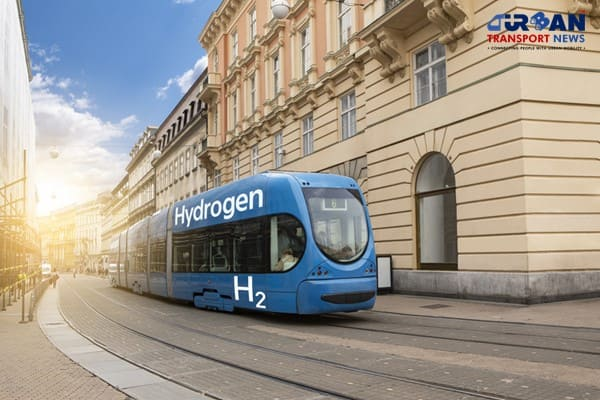In an era where sustainable solutions are vital to combating climate change, hydrogen fuel cells are emerging as a transformative force in urban mobility. According to a 2023 report by Bloomberg Green, the global hydrogen economy could reach $2.5 trillion by 2050. This article explores how hydrogen fuel cells are revolutionizing urban transport, offering a glimpse into a cleaner, more efficient future.
The Rise of Hydrogen Fuel Cells in Urban Mobility
What Are Hydrogen Fuel Cells?
Hydrogen fuel cells generate electricity by combining hydrogen and oxygen, producing only water as a by-product. This technology promises a zero-emissions future, contrasting starkly with the carbon-heavy outputs of traditional combustion engines.
- Efficiency: Hydrogen fuel cells convert chemical energy directly into electrical energy, resulting in higher efficiency compared to internal combustion engines.
- Refueling Time: Unlike battery electric vehicles (BEVs) that require extended charging times, hydrogen vehicles can refuel in under five minutes, akin to traditional gasoline cars.
- Range: Hydrogen fuel cell vehicles (FCEVs) often boast a range exceeding 300 miles, addressing one of the main limitations of current BEV models.
The Growth of Hydrogen Infrastructure
The expansion of hydrogen refueling stations is crucial to the adoption of hydrogen vehicles. As of 2023, there are over 500 hydrogen stations worldwide, with a significant concentration in Japan, Germany, and California.
- Japan: A leader in hydrogen technology, Japan plans to establish 1,200 hydrogen stations by 2030.
- Germany: Home to the largest hydrogen network in Europe, Germany aims to double its current stations by 2025.
- California: With its ambitious climate goals, California is investing heavily in hydrogen infrastructure, aiming for 100 stations by 2025.
Urban Applications and Benefits
Hydrogen fuel cells offer diverse applications in urban settings beyond passenger vehicles:
- Public Transport: Cities like Seoul and Beijing are integrating hydrogen buses, reducing air pollution and noise.
- Logistics and Delivery: Companies like Amazon and UPS are exploring hydrogen-powered delivery trucks to enhance efficiency and sustainability.
- Emergency Services: Hydrogen fuel cells provide reliable power for emergency vehicles and equipment during outages or natural disasters.
Practical Considerations for Adopting Hydrogen Vehicles
How to Choose the Right Hydrogen Vehicle
When considering a hydrogen vehicle, potential buyers should evaluate:
- Range Needs: Determine your typical driving distance to ensure the vehicle meets your daily requirements.
- Availability of Refueling Stations: Check the proximity and accessibility of hydrogen refueling stations in your area.
- Vehicle Options: Compare models from leading brands like Toyota, Hyundai, and Honda, which offer popular FCEVs such as the Toyota Mirai and Hyundai Nexo.
Charging and Maintenance
- Refueling: As mentioned, hydrogen refueling is quick, taking approximately 3-5 minutes, similar to fueling a gasoline car.
- Maintenance: Hydrogen vehicles typically require less maintenance than traditional vehicles due to fewer moving parts and no oil changes.
Cost Considerations
While the initial cost of hydrogen vehicles can be higher than traditional vehicles, several factors can offset this:
- Incentives and Subsidies: Many countries offer subsidies and tax incentives for purchasing FCEVs, significantly reducing the overall cost.
- Lower Fuel Costs: Hydrogen fuel prices are becoming more competitive as production scales up.
Challenges and the Road Ahead
Overcoming Barriers
Despite their promise, hydrogen fuel cells face several challenges:
- High Production Costs: The cost of producing hydrogen, particularly green hydrogen from renewable sources, remains high.
- Infrastructure Development: Building an extensive network of hydrogen refueling stations is capital-intensive and requires coordinated efforts from governments and private sectors.
Future Trends in Hydrogen Mobility
Innovation and investment are driving the hydrogen sector forward:
- Technological Advances: Research into more efficient and cost-effective hydrogen production methods is ongoing, with companies like Toyota and Hyundai leading the charge.
- Policy Support: Governments worldwide are crafting policies to support hydrogen technology as part of broader climate strategies.
Conclusion: The Future of Hydrogen in Urban Mobility
As cities strive to reduce emissions and embrace sustainable transport, hydrogen fuel cells stand out as a promising solution. They offer the range and convenience of traditional vehicles without the environmental downsides. While there are challenges to overcome, the potential benefits of hydrogen technology in urban mobility are vast.
Are you ready to explore the future of transport? Consider hydrogen fuel cells as a pivotal player in the journey toward cleaner, more efficient cities. As we move forward, keeping an eye on policy developments and technological advancements will be key to understanding how hydrogen will power our urban tomorrow.
Join the conversation: How do you see hydrogen shaping the urban landscapes of the future? Let us know your thoughts and stay tuned for more insights into sustainable mobility trends.

